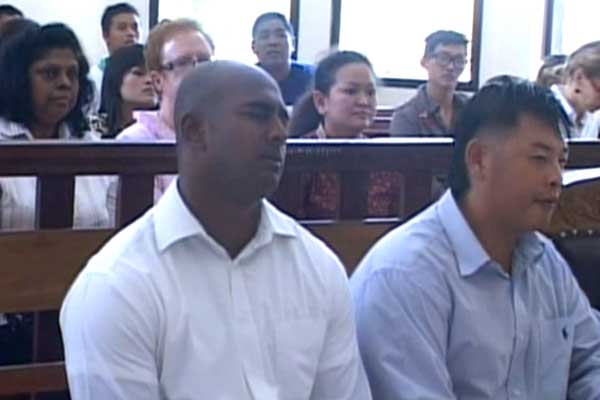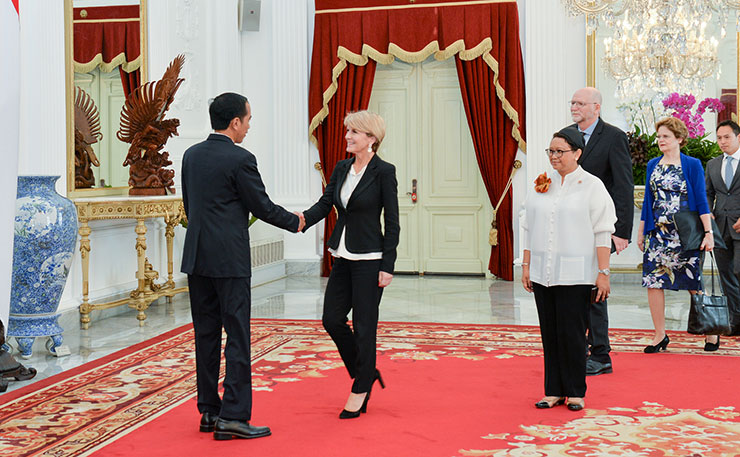Dear Your Excellency, President Joko Widodo, President of the Republic of Indonesia,
I respect you as a worthy President of your wonderful nation. I believe that you will serve your country well during your elected term.
Many Australians have travelled to your country and your people are much loved and admired by those who have met them. My next door neighbour, Mark, visits your country, regularly, and he never ceases to speak highly of everyone he has met in Indonesia.
In the last week, I have met a young Indonesian woman working in Cairns in North Queensland and, like most Indonesian people, she displayed an open and friendly charm that could not be ignored.
It is true that Australians are not always consistent in the way we approach issues affecting our two countries. Australian politicians were venal, some years ago, in not opposing, if not silently supporting, the application of the death penalty to three Indonesian people convicted of involvement in the Bali bombing tragedy.
It is also true that Australian governments have failed to treat your country with respect in the past. The issue of asylum seekers coming to Australia is a case that comes to mind.
Australia has pursued its own political objectives, often at inhuman cost, and by placing unreasonable demands on your country. I read once that Mr Ruddock was described by some Indonesian diplomats as the man with no ears for his propensity to lecture Indonesian officials, and not listen, during discussions.
Also, young Indonesian fisherman, some of them children, have been punished well beyond what is proportionate and reasonable for helping asylum seekers come to Australia. It is very sad that these young people have been forced to languish in Australian jails because of the harshness of our laws.
It is also true that our governments’ treatment of asylum seekers over the last two and a half decades makes it difficult for me to talk to you about the need to act humanely at all times. Our record is one that future Australian generations will be ashamed of. They will fail to understand how we, as a people, allowed our governments to act as cruelly as they have. And as they continue to act.
Despite all that, I do appeal to you to abandon the current planned executions and to reimpose the moratorium on executions that applied in your country for several years until very recent times.
I do speak to you of two Australians, Myuran Sukumaran and Andrew Chan. I ask you to spare their lives. Many other Australians have spoken to you about how these two young men have rehabilitated themselves with the help of your excellent prison officials in Bali.

In my position, as patron of Australians Against Capital Punishment, I have come to know the parents, Chris and Lee Rush, of Scott Rush, another member of the Bali Nine, who was sentenced to death but who is now serving a life sentence on Bali.
Through knowing Chris and Lee, I came to know the heartbreak that parents experience when their child is threatened with death at the hands of the law and the state. I know that the parents, friends, siblings and other relatives of all of those in the current round of planned executions are going through terrible distress and trauma at the imminent threat of their close ones dying at the hands of a firing squad.
The pain of those who are close will never go away if these executions go ahead.
It does not stop there, however. Many Indonesians are dutifully carrying out the decision to resume executions. Some are finding that very difficult and others may not feel as traumatised at this time. However, experience shows that being involved in the process of killing another human being has long-term negative consequences for the mental health and personality of those so involved.
This is a set of serious negative consequences that will continue to flow for your people. I ask you to stop that process, now.
I draw your attention to the speech of Mr Simonovic, the Assistant Secretary General of the United Nations to the Human Rights Council, this week. Mr Simonovic is quoted as saying:
“Several countries continue to use the death penalty for drug-related crimes, with the argument that this harsh punishment is needed for deterrence purposes. However, there is no evidence that the death penalty deters any crime. The focus of crime prevention should be on strengthening the justice systems and making it more effective.”
I strongly believe that Mr Simonovic is correct. I also believe that his statements are supported by the consistent results of research conducted over a broad swathe of time and across different cultures.
Another matter raised by Mr Simonovic is very important. Capital punishment, generally, impacts on low-level operatives in the drug trade. These are often people who have been poorly dealt with by life. They are often poor and have mental health and development problems. They are often immigrants and members of minority groups.
It is additionally wrong to execute the poor and disadvantaged when we know that the rich and powerful go free.
Last, you will have noticed that the pending executions, and those carried out in January, have affected your country’s relationship with a number of other countries. This is not helpful in the long run. Indonesia has much to contribute to the world and the world has much to contribute to Indonesia.
I urge you to stop these executions so that the many constructive aspects of Indonesia’s relationship with Australia and other countries may prosper.
I speak to you as a parent; as a grandparent; as a son and sibling. In all those roles, I feel the pain of those whose loved ones are facing execution. I speak to you as one who loves Indonesia.
I believe that capital punishment is cruel and inhuman. I believe that its negative impacts go far beyond those poor persons who are put to death.
I know you are a humane and wonderful person. I accept that your decision to allow executions to go ahead was made with good motives. But I ask you to change your mind.
I accept also that, on assuming office, you were faced with a situation not of your making. Your predecessor could have made your path easier by extending mercy to all of those on death row at a time when his political future was not at risk.
It is regrettable that he did not see his path clear to do so.
Your people and the world will regard you as courageous and strong for being able to change your mind even when it was difficult to do so.
Your country and the world will be a better place for you having done so.
I want to visit your country in the future and meet many more of your wonderful people.
Please allow all these good things to happen.
Please spare the lives of all those on death row in Indonesia.
Stephen Keim SC is a Brisbane-based laywer and the patron of Australians Against the Capital Punishment. You can find out more about AACP here.
Donate To New Matilda
New Matilda is a small, independent media outlet. We survive through reader contributions, and never losing a lawsuit. If you got something from this article, giving something back helps us to continue speaking truth to power. Every little bit counts.




